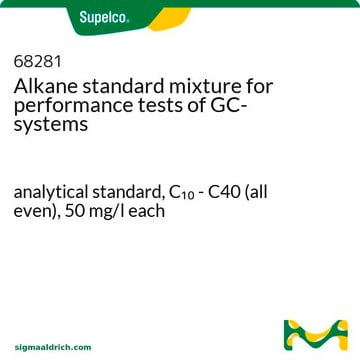69478
N-Methyl-N-(trimethylsilyl)trifluoroacetamide with 1% trimethylchlorosilane
with 1% trimethylchlorosilane, for GC derivatization, LiChropur™
About This Item
Productos recomendados
product name
N-Methyl-N-(trimethylsilyl)trifluoroacetamide with 1% trimethylchlorosilane, for GC derivatization, LiChropur™
Nivel de calidad
grado
for GC derivatization
Análisis
≥97.0%
formulario
liquid
calidad
LiChropur™
idoneidad de la reacción
reagent type: derivatization reagent
reaction type: Silylations
técnicas
gas chromatography (GC): suitable
índice de refracción
n20/D 1.378
cadena SMILES
CN(C(=O)C(F)(F)F)[Si](C)(C)C
InChI
1S/C6H12F3NOSi/c1-10(12(2,3)4)5(11)6(7,8)9/h1-4H3
Clave InChI
MSPCIZMDDUQPGJ-UHFFFAOYSA-N
Descripción general
Aplicación
Información legal
Producto relacionado
Palabra de señalización
Warning
Frases de peligro
Consejos de prudencia
Clasificaciones de peligro
Eye Irrit. 2 - Flam. Liq. 3 - Skin Irrit. 2 - STOT SE 3
Órganos de actuación
Respiratory system
Código de clase de almacenamiento
3 - Flammable liquids
Clase de riesgo para el agua (WGK)
WGK 3
Punto de inflamabilidad (°F)
78.8 °F - closed cup
Punto de inflamabilidad (°C)
26 °C - closed cup
Equipo de protección personal
Faceshields, Gloves, Goggles, type ABEK (EN14387) respirator filter
Choose from one of the most recent versions:
¿Ya tiene este producto?
Encuentre la documentación para los productos que ha comprado recientemente en la Biblioteca de documentos.
Los clientes también vieron
Artículos
Results of a study involving the ability few Fluka silylating reagents to form GC-MS-compatible trimethylsilylmethyl derivatives of NSAIDs
Nuestro equipo de científicos tiene experiencia en todas las áreas de investigación: Ciencias de la vida, Ciencia de los materiales, Síntesis química, Cromatografía, Analítica y muchas otras.
Póngase en contacto con el Servicio técnico









